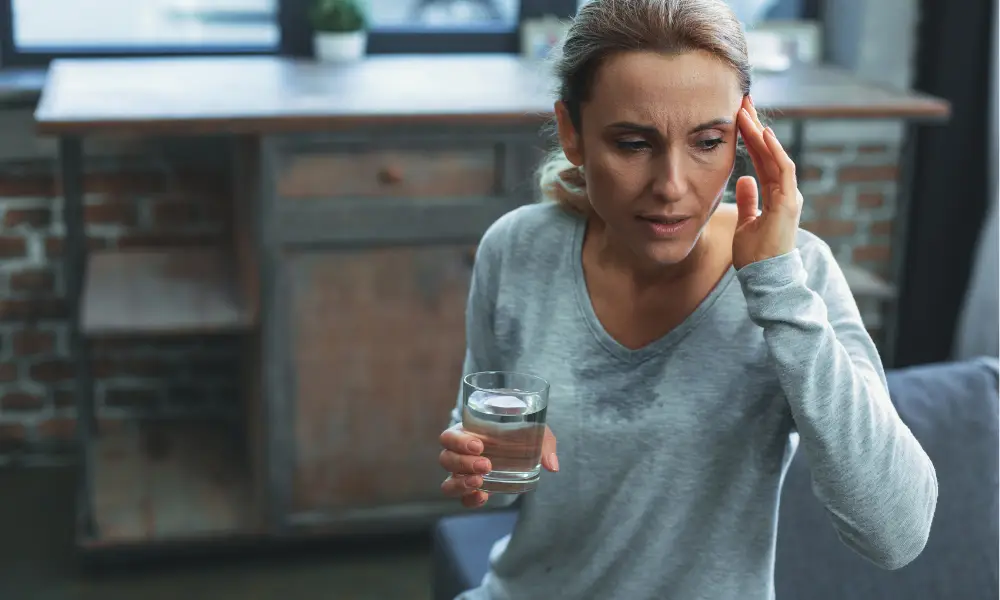Menopause is a natural phase in a woman’s life, marking the end of her reproductive years. Alongside the more commonly discussed symptoms like hot flashes and mood swings, menopause can bring about a range of aches and pains that can significantly impact daily life. In this article, we will talk about menopause aches and pains and their different remedies, lifestyle changes that contribute and more.
Contents
Identifying Menopause Aches And Pains 
Menopause can bring about various physical changes, and aches and pains are common symptoms experienced by many women during this life stage. These discomforts are often linked to hormonal fluctuations and changes in the body. Here are some common types of aches and pains associated with menopause:
- Joint Pain
Hormonal changes, particularly the decline in estrogen levels, can contribute to joint pain and stiffness. Some women may experience conditions like osteoarthritis or rheumatoid arthritis more intensely during menopause.
- Muscle Aches
Changes in hormone levels can affect muscle tone and elasticity. This may lead to muscle aches and pains, especially if there is a decrease in physical activity or muscle mass.
- Headaches
Hormonal fluctuations, especially changes in estrogen levels, can trigger headaches or migraines in some women during menopause. Stress and sleep disturbances may also contribute to headaches.
- Back Pain
Lower back pain is a common complaint during menopause. Hormonal changes, reduced bone density, and changes in muscle mass can all contribute to back pain.
- Breast Tenderness
Hormonal fluctuations can cause breast tissue changes, leading to tenderness and discomfort. This is common during perimenopause, the period leading up to menopause.
- Pelvic Pain
Some women may experience pelvic pain or discomfort during menopause. This can be related to changes in reproductive organs, pelvic floor muscles, or conditions like pelvic inflammatory disease.
- Menstrual Cramps (during perimenopause)
Before menopause, during the perimenopausal phase, menstrual cycles can become irregular and accompanied by more intense cramps. As menopause approaches, menstrual cramps typically decrease and eventually cease.
- Nerve Pain (Neuropathy)
Hormonal changes may also affect the nervous system, leading to symptoms such as tingling, numbness, or nerve pain in various parts of the body.
- Digestive Discomfort
Hormonal changes may affect the digestive system, leading to symptoms such as bloating, gas, or abdominal discomfort.
Natural Remedies For Menopause Aches And Pains
Natural remedies can help alleviate menopause-related aches and pains. It’s important to note that individual responses to these remedies may vary, and consulting with a healthcare professional is advisable, especially if you have specific health concerns or are taking medications. Here are some natural strategies to consider:
Regular Exercise
Regular physical activity even though low impact, helps maintain joint flexibility, strengthen muscles, and improve overall well-being. It can also alleviate muscle tension and reduce the perception of pain.
Dietary Changes
Adopt an anti-inflammatory diet rich in fruits, vegetables, whole grains, and fatty fish. Omega-3 fatty acids found in fish, flaxseeds, and walnuts may help reduce inflammation and support joint health.
Herbal Supplements
Certain herbs may have anti-inflammatory properties and could potentially offer relief from aches and pains. Examples include turmeric (curcumin), ginger, and boswellia. However, it’s crucial to consult with a healthcare professional before using herbal supplements, as they may interact with medications or have side effects.
Calcium and Vitamin D
Ensure an adequate intake of calcium and vitamin D to support bone health. Dairy products, leafy greens, and fortified foods are good sources. Vitamin D helps with calcium absorption.
Magnesium
Magnesium is involved in muscle function and relaxation. Consuming magnesium-rich foods like nuts, seeds, whole grains, and leafy greens may help alleviate muscle cramps and discomfort.
Hot/Cold Therapy
Apply heat or cold packs to affected areas. Warm compresses can help relax muscles and improve blood flow, while cold packs may reduce inflammation and numb pain.
Acupuncture
Acupuncture involves the insertion of thin needles into specific points of the body. Some women find acupuncture helpful in relieving various menopause symptoms, including aches and pains.
Mind-Body Techniques
Practice stress-reducing techniques such as meditation, deep breathing exercises, or guided imagery. These approaches can help manage stress and reduce muscle tension.
Aromatherapy
Essential oils such as lavender, peppermint, or chamomile may be used in aromatherapy to promote relaxation and alleviate tension. Dilute essential oils properly before applying them to the skin or use them in a diffuser.
Stay Hydrated
Proper hydration is essential for overall health, including joint health. Drinking enough water can help reduce stiffness and support the functioning of muscles and joints.
Maintain a Healthy Weight
Achieving and maintaining a healthy weight can reduce stress on joints and relieve pain associated with conditions like osteoarthritis.
Yoga and Stretching
Engage in gentle yoga or stretching exercises to improve flexibility and reduce muscle tension. These activities can be particularly beneficial for joint health.
Lifestyle Adjustments For Relieving Menopause Aches 
Lifestyle adjustments play a crucial role in managing menopause-related aches and pains. These modifications can help improve overall well-being and alleviate specific symptoms associated with hormonal changes. Here are some lifestyle adjustments to consider:
- Strength Training
Incorporate strength training exercises into your routine to build and maintain muscle mass. Strong muscles provide better support for joints, reducing the risk of pain and stiffness.
- Ergonomic Changes
Make ergonomic adjustments to your workspace or daily activities. Ensure proper posture and use supportive furniture to minimize strain on your back, neck, and joints.
- Stress Management
Practice stress-reducing techniques such as meditation, deep breathing exercises, or mindfulness. Chronic stress can contribute to muscle tension and exacerbate aches and pains.
- Adequate Sleep
Prioritize quality sleep. Lack of sleep can contribute to pain perception and exacerbate symptoms. Create a sleep-friendly environment and establish a consistent sleep routine.
- Mind-Body Practices
Explore mind-body practices such as yoga or tai chi. These activities not only promote physical flexibility but also help with stress reduction and relaxation.
- Comfortable Footwear
Wear comfortable and supportive footwear to reduce strain on your feet, knees, and lower back. Properly fitting shoes can contribute to overall joint comfort.
- Avoid Prolonged Sitting
If you have a sedentary job, take breaks to stand, stretch, or walk around. Prolonged sitting can contribute to stiffness and discomfort.
Remember that lifestyle adjustments should be tailored to individual needs, and it may take some time to see the full benefits. Consistency in incorporating these adjustments into your daily routine is key to managing menopause-related aches and pains effectively.
Medical Interventions 
- Hormone Replacement Therapy (HRT)
For some women, hormone replacement therapy under medical supervision can be an effective option for managing menopause symptoms, including aches and pains. - Over-the-Counter Medications
Non-prescription pain relievers, such as acetaminophen or ibuprofen, may offer temporary relief for mild to moderate discomfort. - Consultation with Healthcare Professionals
Seeking guidance from healthcare professionals ensures an individualized approach to managing menopause-related aches and pains. Regular check-ups can monitor overall health and well-being.
Conclusion
As women navigate the intricate landscape of menopause, addressing aches and pains becomes a central aspect of maintaining a high quality of life. By embracing a combination of natural remedies, lifestyle adjustments, and, when needed, medical interventions, women can find relief and embrace this transformative phase with resilience.
If you are facing menopause related issues, menopause treatment at HerMantra can help. Book your free trial online menopause treatment session now.





